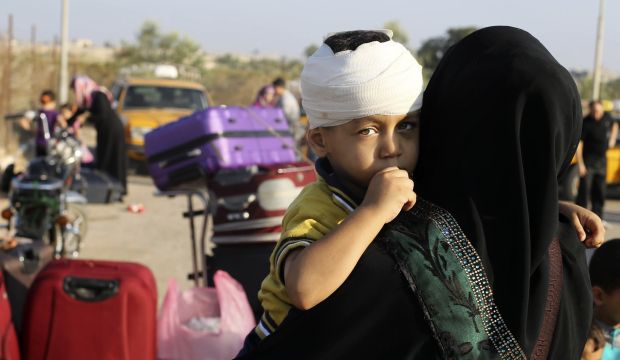
A wounded Palestinian boy, hoping to cross into Egypt with his family, is held by his mother as they wait at the Rafah crossing between Egypt and the southern Gaza Strip August 12, 2014. (Reuters/Ibraheem Abu Mustafa)
Gaza, Asharq Al-Awsat—The Palestinian authorities are running an emergency service at the Rafah crossing on the border with Egypt to help thousands of Palestinians who want to leave Gaza, a senior official told Asharq Al-Awsat.
In comments to Asharq Al-Awsat, the director of Gaza’s Department of Crossings Maher Abu Sabha said that thousands of Palestinians in Gaza are waiting to register their names in order to be able to travel across the Rafah border crossing. The official maintained that his department is operating an emergency service to deal with critical medical cases that need to leave the enclave as soon as possible.
Egypt’s Foreign Ministry released a statement on Sunday announcing that the crossing is open and that over 7,500 people have crossed. Rafah is Gaza’s only link to the outside world, but has for the most part been keep closed by the Egyptian authorities since Hamas took over the Gaza Strip in 2007. Cairo took the decision to open the Rafah Crossing after Israel launched its recent military campaign against Gaza, to allow Palestinians to receive emergency medical care in Egypt.
Abu Sabha claimed that his department had nothing to do with the delays or occasional travel bans imposed on Palestinians.
“The crossing is open for eight hours per day but the actual working hours are only four, during which people can move to the Egyptian side. The Egyptian side leaves the gates open in order for those who are not given access to return,” the official said.
When asked about the number of people crossing, the official said that on average around 550 people use the Rafah crossing per day. But Abu Sabha said that not all of those who leave the Palestinian side are given access by the Egyptian authorities, forcing them to return to Gaza.
He said: “The crossing is somehow open, as you can see, but it is akin to being closed. Movement is very slow.”
According to the official, travel procedures at Rafah have remained the same since Egypt took the decision to re-open the Rafah border crossing. He stressed that there are no signs of improvement, whether in terms of the border crossing being open for longer hours or reduced waiting times.
Abu Sabha added that everything depend on the ongoing talks in Cairo between the Palestinian and Israeli sides.
Asharq Al-Awsat spoke to some of those waiting on the Palestinian side for their travel permits to be issued.
Tasnim Muqayyed said that she wants a permit to leave Gaza in order to join her husband in Sweden. She said that she came to Gaza four months ago to see her parents but did not expect her visit to be interrupted by the war.
“Our people have the right to live and move from one country to another like others,” Tasnim Muqayyed told Asharq Al-Awsat.
Another Palestinian citizen, Mohamed Dahman, said he is eager to return to Dubai as soon as possible, fearing that he could lose both his job and residency permit in the UAE if he faces further delays.
Dahman said he came to Gaza on a short visit two months ago but has been trapped in the enclave due to the war.
